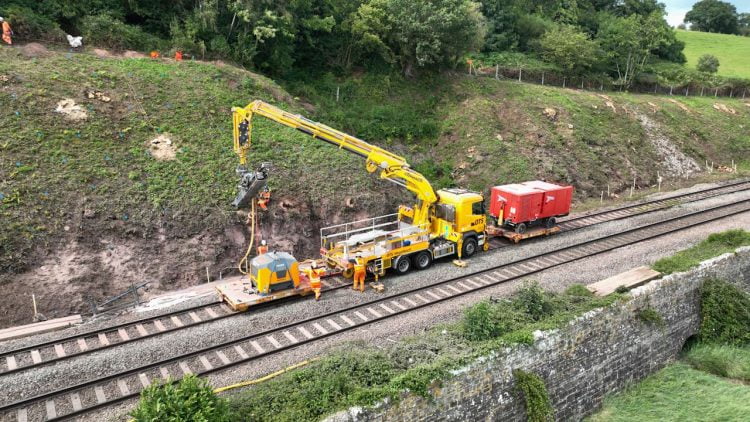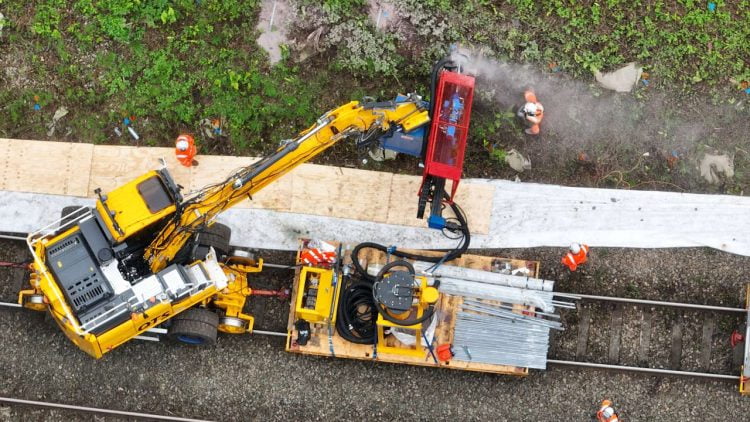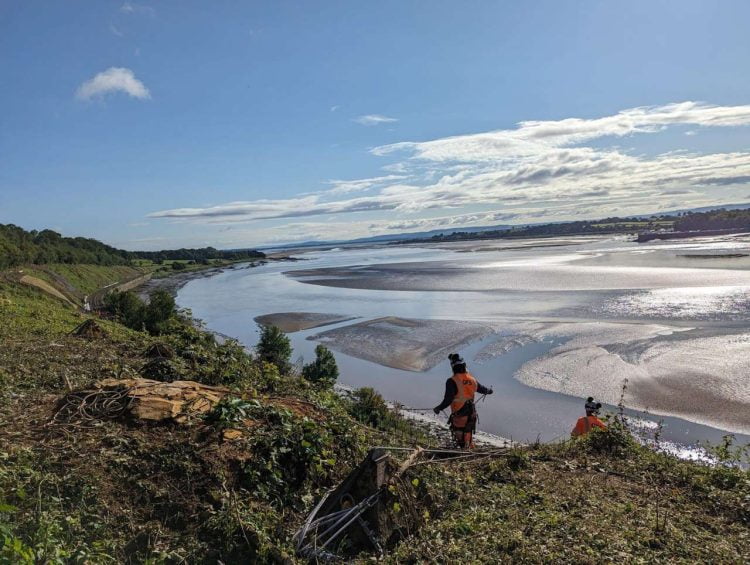The Severn Estuary line has reopened this week (Friday 18 August) after three weeks of work to mitigate the impact of landslips.
Landslips are caused by inclement weather, and the mitigation work will improve train performance and cut delays. This will maximise the reliability of both passenger and freight services.
Over one hundred engineering workers from Network Rail, AmcoGiffen abd QTS Group, worked night and day from Monday 31 July to Friday 18 August, installing a mesh system on the cliffs that overlook the railway between Monmouthshire and Gloucestershire.

The teams worked a total of more than thirty-four thousand hours. Their efforts involved specialist rope access technicians abseiling down the cliff face, removing a thousand tonnes of loose material before securing the netting with five thousand rock bolts. The QTS team deployed its fleet of road rail machinery, including the QTS Mega Reach, the largest RRV (road rail vehicle) lorry loading crane working on the UK rail infrastructure. fully extended, the crane reaches up to twenty-nine metres.
For this project, the Mega Reach was fitted with a specialised drill rig and extended to a reach of twenty metres, which allowed it to drill to the top of the cutting slope from track level. This meant that there was no need to carry out drilling by hand and created a safer, more efficient way of working.
The ‘active’ mesh system was designed specifically for this ptoject, and will hold the cliff face in position, helping to prevent landslips from damaging the railway.
This particular section of the railway was affected by three landslips following a spell of prolonged heavy rainfall in January this year. This caused serious disruption and financial cost. Network Rail had to impose a temporary speed restriction (TSR) of 20mph – reduced from the normal line speed of 75mph. This resulted in nearly six thousand minutes one hundred hours), at a cost exceeding four hundred thousand pounds.
The installation of the mesh means that Network Rail can now remove the TSR, cutting journey times and reducing costs.

This was Phase Two of a wider initiative by Network Rail to improve resilience and mitigate the impacts of climate change on the Wales and Borders route. Phase One installed a ‘passive’ system – that catches debris rather than holds it in place – last summer.
Network Rail and contractors will continue work in the Severn Estuary area until next March, installing more bolts an mesh. This work will not require any disruption to rail services.
The next stage of the resilience project is still being planned, and will probably include workers returning next year to upgrade the ‘passive’ system to an ‘active’ one.

Nick Millington, route director for Network Rail Wales & Borders, said: “We are dedicated to improving resilience across the Wales & Borders route and we’re already seeing the benefit this multi-million-pound investment is having on the Severn Estuary line. The new mesh installed on a different section of the cliff, last Summer, has had zero landslips that have impacted the railway.
“With Phase Two now complete, the whole line is better protected against severe weather events. We will be coming back to carry out more resilience work to further future proof this line against the challenging effects of climate change.
“I would like to thank passengers and the local community for their patience while we carried out these vital improvements.”
Andy Crowley, operation director for Wales & Borders at AmcoGiffen, commented: “We know how important our rail infrastructure is to passengers and freight and we’re delighted to have safely and successfully achieved our targets during this blockade.
“Working diligently alongside our sister company QTS Group, we’ve completed this crucial phase of the essential Severn Estuary Resilience Programme with the cutting slope stabilisation, handing back the blockade on time, as planned.
“This project showcases our commitment to collaboration, excellence and innovation to ensure journey efficiency and reliability for customers with a minimum impact for our lineside neighbours.”
Gary Burnett, Operations Director for QTS, added: “The effort that our team has put into ensuring the success of these works at the Severn Estuary is something to be proud of.
“Being able to utilise the very best in rail plant innovation has allowed us to deliver these works on time, and as efficiently as possible, working in partnership with AmcoGiffen for Network Rail.
“We are pleased to have managed to carry out these works with minimal disruption for our lineside neighbours and thank them for their patience during the period of works.”





Responses